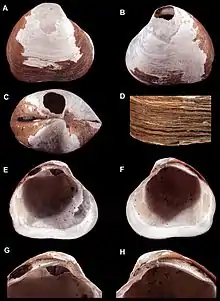Wallerconcha sarae
Wallerconcha sarae is an extinct species of saltwater clam, a marine bivalve mollusc in the family Thyasiridae. The species was discovered in 2014 by Paul Valentich-Scott of the Santa Barbara Museum of Natural History and three scientists from the United States Geological Survey, Charles L. Powell, Brian D. Edwards and Thomas D. Lorenson by Arctic Ocean, whilst mapping the sea floor. It was discovered by accident inside a sediment core sample[1][2] extracted more than 1.5 miles (2.5 km) below the surface of the ocean off the coast of northern Alaska, US, in 2010.[3]
| Wallerconcha sarae | |
|---|---|
 | |
| Wallerconcha sarae holotype | |
| Scientific classification | |
| Kingdom: | Animalia |
| Phylum: | Mollusca |
| Class: | Bivalvia |
| Subclass: | Heterodonta |
| Order: | Lucinida |
| Family: | Thyasiridae |
| Genus: | †Wallerconcha |
| Species: | †W. sarae |
| Binomial name | |
| †Wallerconcha sarae (Valentich-Scott and Powell, 2014) | |
Etymology
It is reported that it was named after Sara Powell, the daughter of Charles L. Powell, one of the co-discoverers,[4] who is credited in saying "I want to name new species after all of my children."[5][6]
Gallery
-from-deep-water-Beaufort-Sea-northern-zookeys-462-011-g007.jpg.webp)
References
- "Ancient creature discovered in the depths of the Arctic Ocean". www.geologypage.com. 11 December 2014. Retrieved 8 June 2016.
- "WoRMS - World Register of Marine Species - Wallerconcha sarae Valentich-Scott & C. L. Powell, 2014". www.marinespecies.org. Retrieved 8 June 2016.
- 2014 (10 December 2014). "New mollusc group discovered". BBC Earth. Retrieved 15 May 2017.CS1 maint: numeric names: authors list (link)
- Valentich-Scott, Paul; Powell, Charles; Lorenson, Thomas; Ewards, Brian (10 December 2014). "A new genus and species of Thyasiridae (Mollusca, Bivalvia) from deep-water, Beaufort Sea, northern Alaska". ZooKeys. 462: 11–26. doi:10.3897/zookeys.462.6790. PMC 4284429. PMID 25589851. Retrieved 15 May 2017.
- "Ancient creature discovered in the depths of the Arctic Ocean". Science Daily. Pensoft Publishers. Retrieved 15 May 2017.
- "Million-year old molluscs Wallerconcha sarae may be ancient survivors". news.com.au. 11 December 2014. Retrieved 15 May 2017.